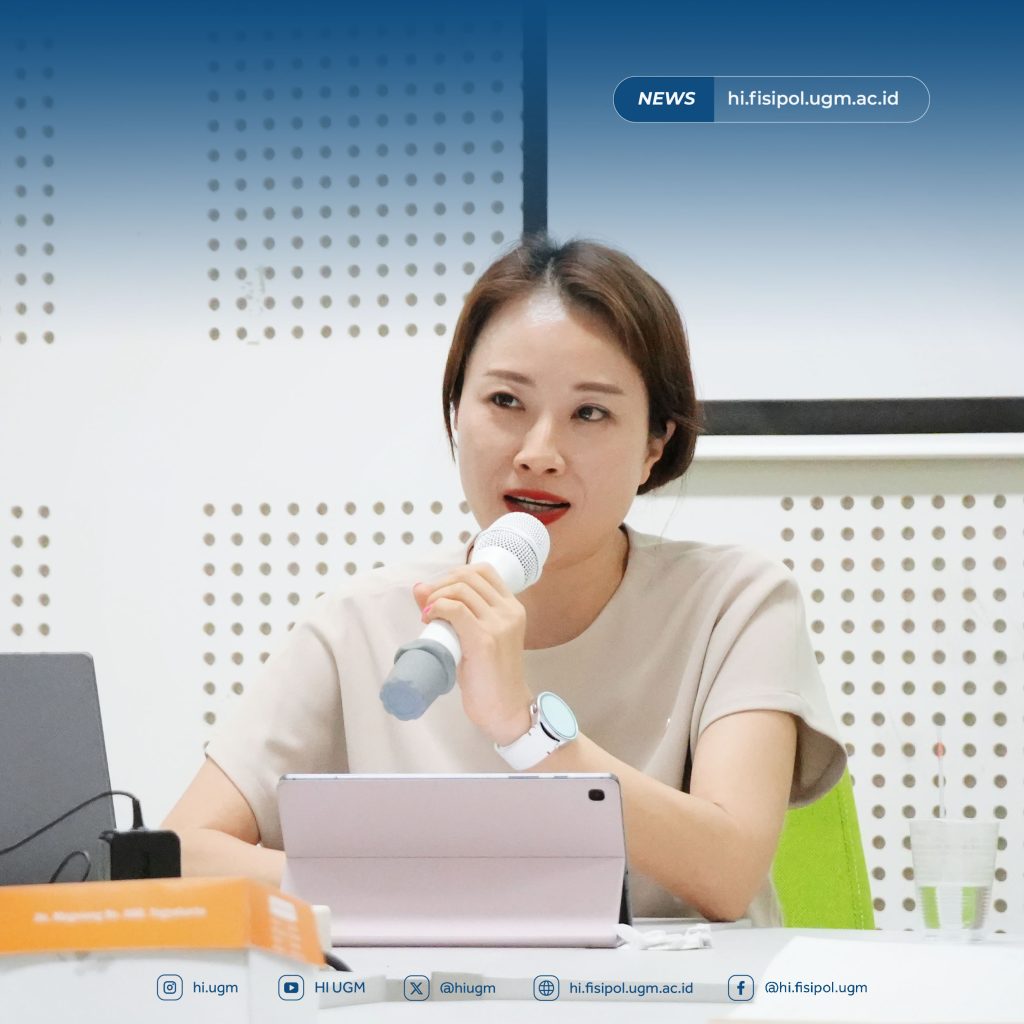Yogyakarta, 24 July 2024 – The Department of International Relations, Universitas Gadjah Mada in collaboration with the Center for Southeast Asian Social Studies UGM; Center for Southeast Asian Studies, National Chengchi University; Department of Educational and Futures Design, Tamkang University; held an insightful talk titled “Korea’s KASI (Korea-ASEAN Solidarity Initiative) Strategy & Indonesia-South Korea Relations.” The event took place in a hybrid format, both in-person at Room BA207 and virtually via Zoom, attracting over 50 participants, including lecturers, staff, and students. The lecture was delivered by Prof. Gu Bo Kyung from Busan University of Foreign Studies, with Muhammad Rum, a lecturer from the Department of International Relations at Universitas Gadjah Mada, serving as the moderator.
Prof. Gu Bo Kyung commenced the session by posing a thought-provoking question about the extent of Korean influence in Indonesia, which elicited enthusiastic responses from the audience. The discussion highlighted the significant impact of the Korean wave on Indonesian society, spanning entertainment, food, culture, and more. Following this interactive introduction, Prof. Gu delved into a comprehensive analysis of the multifaceted relationship between Indonesia and Korea, focusing on economic collaborations and cultural exchanges. The talk emphasized the strategic importance of the Korea-ASEAN Solidarity Initiative in fostering closer ties between the two nations. From Korea’s perspective, Indonesia’s Pacific strategy is vital in the broader regional dynamics. Indonesia’s strategic location and active participation in Pacific affairs enhance its significance as a partner for Korea. The Pacific strategy aligns with Korea’s regional goals of promoting stability, economic growth, and multilateral cooperation. Prof. Gu highlighted that Indonesia’s efforts to engage more deeply with Pacific nations resonate with Korea’s vision of a connected and collaborative region.
In terms of financial support, the Republic of Korea provides funding to three significant regions through various funds: the ASEAN-Korea Cooperation Fund, the Mekong-ROK Fund, and the BIMP-EAGA (Brunei Darussalam-Indonesia-Malaysia-Philippines East ASEAN Growth Area) ROK Fund. In Indonesia, this funding covers Kalimantan, Papua, Sulawesi, and Maluku. In Malaysia, it includes Sabah, Sarawak, and Labuan. The funding also extends to Brunei and the Philippines, fostering regional development and strengthening bilateral relationships.
Moreover, Prof. Gu highlighted why ASEAN is crucial for Korea. ASEAN is recognized as the engine of global economic growth and a hub of regional multilateralism. A hub that coordinates relations between three or more states to pursue common goals and manage shared problems through cooperative approaches. Key reasons for ASEAN’s importance include its geostrategic position, economic strength, and leading cooperation mechanisms. The speaker also emphasized why Indonesia is valuable to Korea. Indonesia serves as a vital source for the supply chain, a regional leader, and an emerging power nation. Notably, Indonesia boasts the fourth-largest population in the world, making it a substantial market for Korea. These factors underline Indonesia’s strategic role in Korea’s regional and global economic strategies.
After the lecture, Prof. Gu invited participants to offer suggestions on how to further strengthen Korea-Indonesia relations. Two key areas were identified for potential collaboration. Firstly, Inter-Institutional Collaboration. Building partnerships between academic and research institutions in Korea and Indonesia could facilitate knowledge exchange, joint research projects, and academic cooperation. Secondly, fishery knowledge and technology exchange. Sharing expertise and technology in the fishery sector could benefit both countries, improving sustainability practices, enhancing fishery management, and fostering innovation in aquaculture. These suggestions aim to deepen the bilateral relationship and enhance mutual benefits in these critical areas.

